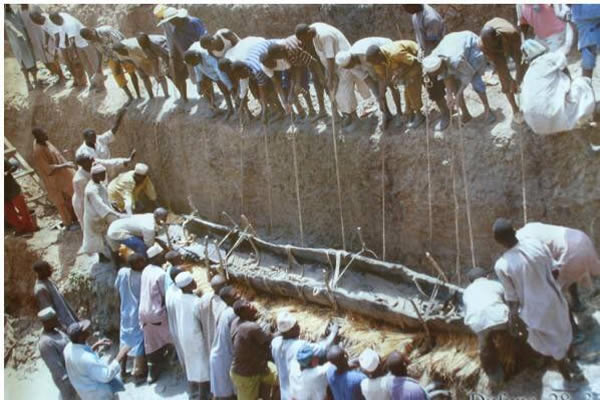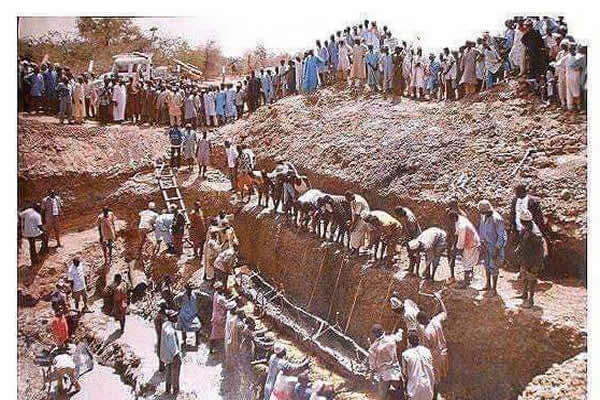
Since the Dufuna canoe was discovered by a local Fulani herdsman in 1987 archaeologists have been in a frenzy about the discovery. The canoe which was excavated by a combined team of Nigerian and German archeologists in 1994 at Dufuna, has continued to amaze them, for the simple reason that it has changed the course of history. Dufuna is a village along the Komodugu Gana river in Fune local government area of Yobe State. The boat was dug out from a depth of five meters beneath the earth's surface and measured 8.4 meters in length, 0.5 meters wide and about 5 cm thickvarying at certain parts of the surface. The age of the boat has beenput at about 8000 years old (6000 BC), thus, becoming the oldest boatin Africa and third oldest on earth.
The canoe belongs to the Late Stone Age period (Neolithic Age), when humans ceased to roam the face of the earth hunting to become herdsmen and cultivators and in the process becoming modifiers of their environment, with complex social structures, in response to new problems and ways of dealing with situations."The discovery of this boat is an important landmark in the history of Nigeria in particular and Africa in general" said the late Dr. Omotoso Eluyemi then the Director of the National Commission for Museums and Monuments. Besides proving that the Nigerian society was at par(if not earlier) than that of Egypt, Mesopotamia, and Phoenicia, the discovery also provides early concrete evidence that Africans have been exploring technology to modify their environment and suit their needs.
But more importantly, "the canoe has shown that people in the Niger area had a history of advanced technology and that they had mastered the three major items of neolithic culture which included the fashioning, standardization and utilization of tools according to set traditions."It gives concrete evidence of transportation by seas as well as providing evidence of some form of long distance commercial activities indicative of existing political and economic structures."
One great benefit of the discovery is that it has helped archaeologists draw a relationship between what was happening in Nigeria and else where in the world during that period. Indications are that while Nigerians were making boats in Dufuna village in 6000 BC, the people of Catol Huyuk in Turkey were making pottery, textiles etc, and the Chinese were making painted pottery in the Yang Shao region. But particularly of interest to archaeologists is the proof that some form of advanced civilization existed in the Lake Chad Basin around 6000 BC."
Documentation has showed that based on the minimal available technology during this period, the making of the Dufuna canoe must have been a ponderous task which called for mastery, specialization and ingenuity. A lot of work, man hours and skill must also have been put into the production since no iron tools were in existence at the time. It can be assumed that the canoe must have been made near a river to eliminate the difficulty of transporting it over long distances.

A Fulani herdsman who roamed the desert lands of Northern Nigeria in search for pastures, descended into one of the dry valleys drained by the gentle flowing prongs of Koma Dugu Gana River in the northern part of Yobe State. It must have been a dry season. The location lies on the outskirts of a small sleepy community called Dufuna village. Malam Yau’s cattle drifted wearily down the dusty slopes and came to a stop near a small depression in the earth. They were tired and dehydrated. Ya’u decided to act fast before any of his livestock collapses. He began to dig a well. He had not dug beyond 5m when he struck a bulk of buried dark wood. This seemed mysterious to him and he immediately called on the Village Head of Dufuna community who later reported the finding to local government officials in the area.
This discovery took place on May 28, 1987 and led to the unearthing of the oldest canoe in Africa and the third oldest canoe in the world, dating to over 8000 years (6000BC).With the collaboration of Archeologists from University of Maidiguri, Nigeria and Universities in Germany, chips from the ancient canoe were subjected to Carbon 14 (C-14) dating which placed the age of the boat at 7264 ± 55 bp (KN-4683) and 7670 ± 110 bp (KI-3587) (uncalibrated) approximating to 8000 years; measuring 8.4m in length, 0.5m in width and about 5cm thickness.
Further efforts and collaboration between Archeologists from both Nigerian and German Universities finally resulted in the successful excavation of the canoe from the ground in March 1998. The lifting of the canoe from its 5m-deep subsurface location took about 50 labourers and two weeks to accomplish. “The Dufuna Canoe was found water-logged on a sandy base with intermittent intervals of clay, and inaccessible to oxygen; circumstances most favourable for most organic materials,” said Abubakar Garba, an associate professor of archaeology at the Centre for Trans-Saharan Studies, University of Maiduguri in Borno State, who as an active participant on the team that excavated the canoe.The excavated canoe is presently preserved and exhibited at a Museum complex in Damaturu, Yobe State capital, built by the National Commission for Museums and Monuments (NCMM).
This amazing archeological discovery holds a significant place in the great history of Nigeria and Africa at large. The skillful and creative crafting of the canoe’s bow, stern and overall elegant form demonstrates the height of technological ingenuity and inventiveness of our ancestors. It also gives a possible clue to the extents of the present-day ‘shrunk’ Lake Chad back in the Neolithic times. Since the age of this canoe predates the Iron-age, some people ask how Africans were able to cut down and carve logs of wood into a beautiful form as the Dufuna Canoe.
The fact that cutting tools of flint were found at Iho-Eleeru Cave in western Nigeria which dates back to 9200BC, gives a clue to the suite of cutting and carving tool -types that could be available for use at the time of creation of the Dufuna Canoe. I believe there are still many more mind-blowing artifacts and archeological sites waiting to be discovered and excavated in Nigeria. However, the Dufuna Canoe again records another one of the numerous tourist potentials our country, Nigeria is blessed with.
Emergency Numbers (+234 7039301585, 08035067570)
Banks in Yobe
Brief History of Yobe
Business and Economy
General and Teaching Hospitals
Hotels and Guest Houses
Yobe State Ministries Agencies and Parastatals
Police Stations
Popular Markets
Restaurants, Bars, Night Clubs
Shopping Malls
Traditional Rulers
TOURIST ATTRACTIONS
Dagona Birds SanctuaryDokshi Spring Water
Dufuna Canoe
Tulo-Tulowa
FESTIVALS AND CARNIVALS
Bade Fishing & Cultural Festival
Barakau Festival
Kamti Festival




